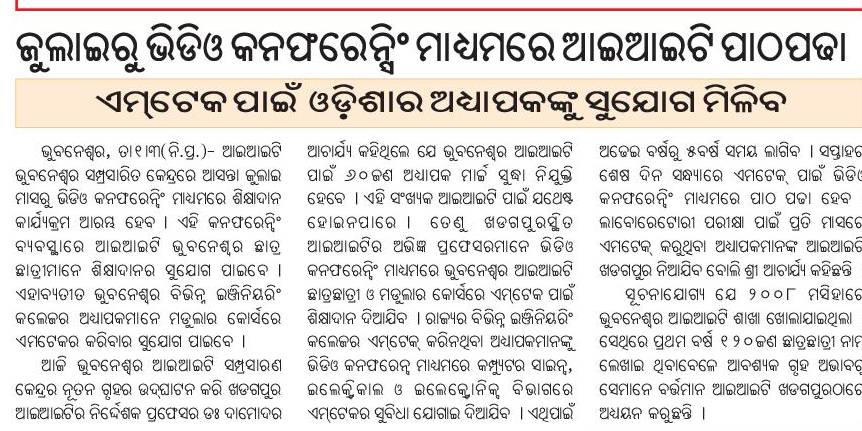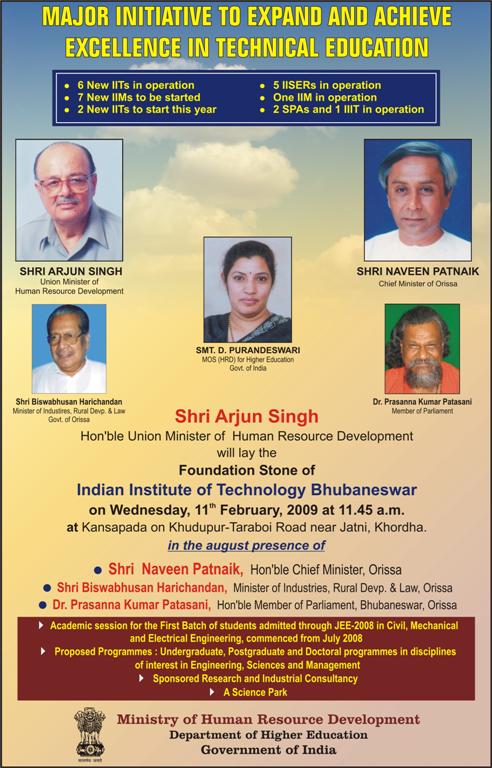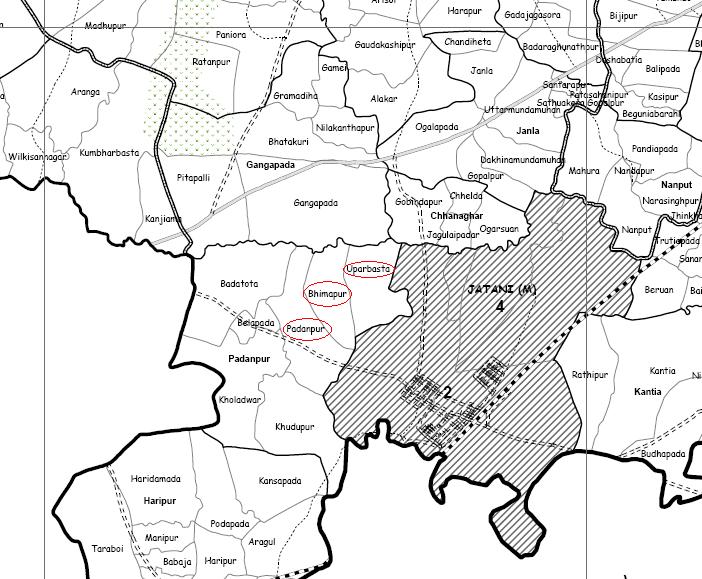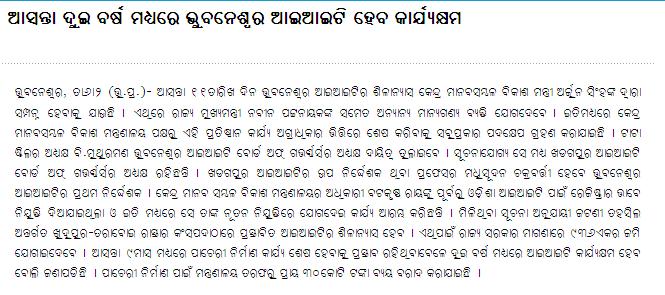Following is an excerpt from a recent (March 22, 2009) report from Economic Times.
… The proposal for setting up AIIMS-like institutions was first made in 2003 by the then BJP-led NDA government. It was, however, cleared by the CCEA on March 16, 2006, 10 months after the UPA government came to power.
It was decided that each site would be taken as a separate and independent project instead of clubbing all six together. The construction of housing and the hospital complex was also separated from that of hospital and medical college.
Speaking to TOI , Joint Secretary in the Health Ministry B K Prasad said the layout and master plans of the hospital sites at Bhopal, Bhubaneswar, Jodhpur and Rishikesh had already been approved. The approval of the master plans for Patna and Raipur is expected on March 25. Meanwhile, the Rajasthan State Road Development Corporation construction has started construction work on the residential complex (housing and hostel) in Jodhpur. The work relating to construction of the residential complex at Rishikesh, Patna, Bhubaneswar and Raipur has been entrusted to two different agencies.
Prasad said, "Hostel construction in the other sites will start latest by June and should be completed by December 2009. Hospital construction should start by October and will take 24 months to complete. Each hospital will have 960 beds with 29 super-speciality departments."
Following is an excerpt from a report in jaibihar.com.
Taking a serious note of the inordinate delay in completion of Jai Prakash Narayan All India Institute of Medical Science (JPNAIIMS) here, the Patna High Court on Tuesday asked the union government to float fresh tender on the revised estimate and commence the actual construction of the proposed medical college and hospital complex in 90 days.
While hearing a PIL urging the court’s intervention for completion of JPNAIIMS project within a time frame, a division bench, comprising Justice Shiva Kirti Singh and Justice Sheem Ali Khan, directed the Union Government to file an action taken report (ATR) on the next date of hearing.
Complaining about the dilly-dallying attitude of the centre, M P Gupta, counsel for the petitioner, Council for Protection of Public Rights and Welfare, referred to earlier records which revealed that on May 15, 2006 the estimated expenditure was Rs 332 crore, which was hiked to Rs 533.15 crore on February 25, 2009, but till date the actual construction work had not commenced.
April 6th, 2009
Rohit Kumar, a student at IIT Khargpur died today because of lack of facilities at BC Roy Hospital (should not really be called an hospital). Having spent a night at that hospital after an insect flew inside my ear, I have first hand experience involving BC Roy as well as the lack of proper medical facilities at Kharagpur.
The bigger tragedy is that when the lack of healthcare facilities in BC Roy hospital was pointed out by the students three years ago in the student newspaper, the authorities decided to punish the student paper and shut it down for some time.
I hope this time the authorities will take it seriously and find a long term solution. The current director of IIT Kharagpur has in the past implemented many innovative and bold ideas and here is a bold idea (bold in the context of West Bengal and its unions) that may solve the problem.
IIT needs to close down BC Roy operations and contract its health care operations to a reputed private company such as Apollo. (The company Vedanta is doing something like that.) A student and employee committee can come up with a specification of what medical services should be available on campus and invite bids from reputed health care companies and then pick the best. I don’t think money would be a problem. This is the way to go as health care is not a core competency of IIT Kharagpur and someone very good in that field should be the one taking care of the health care facilities at IIT Kharagpur.
This should be the model used in other universities and institutes that are in places without good health care facilities; or perhaps in all universities and institutes. Note that a lot of the proposed new central universities are being located in small towns without proper health care facilities. This is the time to take this issue into account and plan properly.
March 23rd, 2009
Following is an excerpt from a report in Business Standard.
“Construction work on NISER-Bhubaneswar is expected to take off within two months and the entire campus is scheduled to be functional within four years. Once the NISER-Bhubaneswar campus is fully operational, it would have an intake of about 2,000 students which may later scale up to 4,000”, Abhaya Kumar Nayak, registrar, NISER-Bhubaneswar told Business Standard. NISER-Bhubaneswar which is currently operating out of the campus of the Institute of Physics has an intake of around 100 students. The institute is presently offering a five-year integrated MSc programme , an MSc cum Phd programme and individual Phd programmes in four basic sciences- physics chemistry, biology and mathematics.
New courses on computer sciences, earth and planetary sciences as well as engineering sciences are proposed to be introduced after the full-fledged campus of NISER-Bhubaneswar becomes operational.
NISER-Bhubaneswar would be a Centre of Excellence for teaching and research in four basic areas of science. Apart from separate academic blocks for different areas of science education and research, the NISER-Bhubaneswar campus will have planned academic and residential townships with all modern amenities and recreational facilities.
March 19th, 2009
Following is from a report in Pioneer.
Dr Abhaya Kumar Nayak, the former Registrar of the IIT Kanpur, joined as the Registrar of the National Institute of Science Education and Research (NISER), Bhubaneswar. He is the second permanent staff of the institute after the join of the director. The students, faculty members and staff of the institute are very happy with the new administrative head.
The first institution of its kind in the country set up by the Department of Atomic Energy, NISER, is striving to be recognised as a centre of excellence in science education and research in basic sciences.
Dr Nayak was the District Employment Officer at Rourkela, Jharsuguda and Sambalpur from 1991 to 2000. He also worked as a lecturer in economics at the Sudarsan Mahavidyalaya in Cuttack and in the Accounts Department of the Khurda Division of the SE Railway.
March 15th, 2009
(Thanks to Abi for the pointer.)
In the document here just above Section 1.7 it says:
NOTE: Candidates with BE/ B Tech/ M Sc or equivalent degree who may not have qualified in any of the above mentioned National Entrance Tests will also be considered for the Ph D program in Engineering. Short listing for interview of such candidates is based on their academic performance in the qualifying degree (upto 3rd year in BE / B Tech, or 1st year in M Sc), and their performance in 10th and 12th /PUC examinations.
I have heard from a friend in IIT Kharagpur that this is also possible in the IITs but could not find it in the Ph.D program page of IIT Kharagpur. If one is interested they may directly contact a faculty in the apropriate IIT regarding this.
March 10th, 2009
Following is an excerpt from a report in the Telegraph.
The Indian Institute of Science Education and Research (IISER) in West Bengal is set to become the first such institute in the country to offer an integrated masters degree in earth science.
There are five IISERs in the country, set up on the lines of the Indian Institute of Science in Bangalore.
The earth science course will be introduced in the next session and will cover subjects such as palaeontology, geo-chemistry, seismology, climatology and space science.
“Geo-chemistry will be a topical subject in Bengal. It will cover arsenic contamination, which is a major problem in the state. Space science, too, is neglected in Bengal,” said Dibyendu Nandi, an assistant professor at the IISER in Nadia.
… The institute will also offer an integrated PhD programme from August 2009 that will be open to graduates. The course duration will be five-seven years.
“The first two years will be for a masters course. A doctorate usually takes three to four years but may take longer in the field of science. Students will have up to five years to complete their PhD,” said Nandi.
In 2009, the PhD aspirants will be selected on the basis of their applications and interviews but from the next year there will be an all-India entrance test.
Both courses will be offered on the IISER’s new campus in Mohanpur in Nadia. “The 200-acre campus should be ready by the end of 2010,” said Nandi.
In keeping with its objective of making education and careers in basic sciences more attractive, the institute is also reaching out to students in schools and colleges.
… The institute is also planning to visit colleges across Bengal to spread awareness about science and research.
March 6th, 2009
(Thanks to Jagmohan Swain for suggesting to write about this.)
See the data at https://www.orissalinks.com/archives/1303.
Aggregate Total for every 500th rank in Common Merit List
|
Rank in Common Merit List
|
Aggregate Marks
|
|
1
|
433
|
|
501
|
287
|
|
1001
|
263
|
|
1501
|
248
|
|
2001
|
236
|
|
2501
|
227
|
|
3001
|
219
|
|
3501
|
212
|
|
4001
|
206
|
|
4501
|
200
|
|
5001
|
195
|
|
5501
|
191
|
|
6001
|
186
|
|
6501
|
182
|
|
7001
|
179
|
|
7501
|
175
|
|
7903
|
172
|
… first paper of IIT JEE 2008 consisted of 69 objective question with 246 marks. Second paper was also of same marks. So the full marks of IIT-JEE 2008 examination was 492. All questions were of objective type with negative marking. The duration of each paper was three hour.
… For OBC quota cutoff will be around 170 marks for rank 4000.
Based on the above and the open-close numbers given at https://www.orissalinks.com/archives/1303 one can see that one can get into an IIT by scoring 45% in the IIT JEE.
March 1st, 2009
Following is an excerpt taken today from IIT Bhubaneswar’s home page. It gives some idea on what IIT Bhubaneswar is aiming for.
IIT Bhubaneswar with its 935 acres of land will be designed to have a self contained campus for 10,000 students and 1100 faculty. A Science Park will be part of this institution. The Park will house a large number of industry supported R&D units. It will promote industry relevant collaborative R&D activities with the institute and facilitate practice relevant education.
The Institute will offer education and research programmes in disciplines of national and global interest. The specific local needs will also be taken care of. To promote inter-disciplinary education and research, the Institute will not have many narrow specialization oriented departments. It will have few Schools and each School can offer several programmes.
The Foundation Stone for this IIT was laid on February 12, 2009. An estimated amount of Rs.780 crores will be spent in next few years to develope this Institute. A Master Plan for this Institute is being developed. Global tender for choice of Architect has been floated. Within next 2 years, the Institute will be operational from the new campus.
February 26th, 2009
The six new IITs that started classes last year are:
Here are some observations regarding visible progress with respect to these IITs.
February 15th, 2009
Following is the main contact person for IIT Bhubaneswar:
Bata Kishore RAY
Registrar
IIT Bhubaneswar
Samantapuri
(Behind Hotel Swosti Plaza)
Nandan Kanan Road
BHUBANESWAR-751 013
Tel: 91-674-2301982
Fax: 91-674-2301983
Email: iitbhubaneswar@yahoo.com
Web: www.iitbbs.ac.in
Beyond the above, the other names associated with IIT Bhubaneswar are:
- Director Designate: Prof. Madhusudan Chakrabarti
- Mentor Director: Prof. Damodar Acharya
- Chairperson of BOG (Board of Governors): B. Muthuraman (MD of Tata Steel)
February 12th, 2009
Following is from the PIB report http://pib.nic.in/release/release.asp?relid=47448.
| Foundation Stone of Indian Institute of Technology, Bhubaneswar, laid
TO ACT AS A CATALYST FOR THE RAPID INDUSTRIALIZATION OF THE STATE
|
| |
15:15 IST |
Foundation Stone of the Indian Institute of Technology ( IIT ), Bhubaneswar, was laid in Orissa today. Shri Arjun Singh, Union Minister of Human Resource Development, was to lay the Foundation Stone, but due to unavoidable reasons he couldn’t go to Orissa and the ceremony was held in his absentia at KANSAPADA ( Khudupur-Taraboi Road ) near Jatni Block Office, Khordha.
This new IIT at Bhubaneswar is part of the 8 new IITs that have been established in the country by the Union Ministry of Human Resource Ministry. Orissa is also to get a new Central University under The Central Universities Ordinance, 2009 which was promulgated by the President of India on 15.01.2009.
Following is the full text of the speech of Shri Arjun Singh, delivered on his behalf :
“ IITs are our national pride and owe their existence to the scientific temper and disposition of our First Prime Minister Pt. Jawahar Lal Nehru. Making India, the knowledge hub of the world was a cherished dream of our first Prime Minister Pt. Jawahar Lal Nehru. Way back in 1951, the Government of India, under the leadership of Panditji, planned to have four such institutes of excellence in the field of Engineering and Technology. The first amongst four such institutes (one for each zone) came up at Kharagpur in eastern region.
During the Eleventh Plan Period, the Government of India has decided to have eight new IITs, including IIT Bhubaneswar. IIT Bhubaneswar was one of the new IITs to become operational with 120 students in July, 2008. It is also heartening to note that the mother of the IIT system, IIT Kharagpur, is mentoring this new IIT. I would like to compliment Prof. Damodar Acharyaji, Director, IIT, Kharagpur who has made all possible efforts to mentor this IIT. The necessary facilities are being created in IIT Kharagpur Extension Campus at Bhubaneswar so that the students of IIT Bhubaneswar could have their education from Bhubaneswar itself from the forthcoming academic session starting from July 2009. IIT Bhubaneswar will offer science based engineering graduate, postgraduate and doctoral programmes of international standard in various disciplines.
The State of Orissa is a resource-rich state and we expect that IIT, Bhubaneswar will act as a catalyst for the rapid industrialization of the State. Indian Institutes of Technology are known the world over for imparting quality and relevant education to students. I am confident that this new IIT also carry forward the great tradition of IITs.
I am happy to note that the Government of Orissa has allotted 935 acres of land for this IIT. The State Government has also agreed to provide adequate facilities of water, electricity and road connectivity. I appreciate the support of the Government of Orissa to have this IIT in Bhubaneswar and would like to specially thank Shri Naveen Patnaikji for his support for the venture.
I take this opportunity to mention that we had made an assessment of various States about availability of degree and diploma level courses per lakh population in the field of technical education. We find that the availability of degree and diploma level courses per lakh population in Orissa is much below the national average. This obviously means that the regional imbalance in respect of technical education needs to be corrected. It is in this context that the setting up of an IIT in Bhubaneswar is a right and timely step. I am sure the Government of Orissa will derive maximum benefits from the Central Government schemes for educational advancement of this State.
The Government of India in its Eleventh Plan has given a major thrust to education. The Central Government has taken several initiatives in respect of new institution building. These include setting up of 30 new Central Universities, Indira Gandhi National Tribal University, eight new IITs, seven new Indian Institutes of Management (IIMs), five new Indian Institutes of Science Education and Research (IISERs), two new Schools of Planning & Architecture (SPAs), 10 new National Institutes of Technology (NITs) and 20 new IIITs. For this unprecedented expansion, the credit goes to the Hon’ble Prime Minister, who has been kind enough to accord very high priority to the education sector and provided a nine fold increase in the budgetary outlays for the higher education during the XIth Plan as compared to Xth Plan.
Capacity building in the diverse fields of basic science, engineering and technology, architecture, management will empower besides providing opportunities to the youth. It has been decided to launch a massive National Initiative for Skill Development under which it is proposed to give assistance for the establishment of 1000 new polytechnics. It is also proposed to upgrade infrastructure facilities of existing diploma level Government and Government aided polytechnics. In order to attract women in polytechnic education, we are proposing to provide financial assistance for the construction of women’s hostels in 500 polytechnics.
The Government is also going to incentivise the States for starting new Universities, besides giving a one time grant to the States on a matching basis to develop the infrastructure of State technical institutions. With these initiatives, we hope to increase access (by 5% GER during XI Plan) with equity and excellence.
8. I am happy to say that the State of Orissa is also getting its due share. We have decided in this Plan Period to have in Orissa State, one Central University, one National University aiming for world class standards, one IIIT, and several Polytechnics in those districts which currently do not have a Polytechnic. The Government and Private Engineering Colleges will also be getting opportunity to upgrade their facilities through TEQIP. This will provide our youth in the State with vocational and professional educational opportunities to realize their full potential.”
————————–
KKP/ska
February 12th, 2009
In Section 8.44 (page 174) of Volume 1 (Inclusive Growth) of the 11th Five Year Plan, the following is mentioned.
The DAE has also initiated the process for establishment of the NISER at Bhubaneswar, at par with the IISER to undertake integrated five-year Masters’ courses and integrated M.Sc–Ph.D. programme in core and emerging branches of science to provide world-class education to students.
February 10th, 2009
(The PIB report is at http://pib.nic.in/release/release.asp?relid=47274.)
The following is excerpted from a report in Hindu.
The Union Cabinet on Thursday approved two more AIIMS-like medical institutions, one in West Bengal and the other in Uttar Pradesh, at a cost of Rs.823 crore each. The Cabinet also decided to upgrade five government medical colleges in five States to the level of the All-India Institute of Medical Sciences in New Delhi.
Announcing this, Union Home Minister P. Chidambaram said: “The proposed institution in West Bengal will come up at Raiganj in North Dinajpur district. The site for the AIIMS-like college and hospital in UP has not yet been identified.”
Raiganj is represented in the Lok Sabha by the ailing Union Minister Priyaranjan Dasmunsi.
Each institution, to be set up under the second phase of the Pradhan Mantri Swasthya Suraksha Yojna (PMSSY), will have a 960-bed hospital and will provide health care facilities in 39 speciality or super-speciality disciplines.
There will be 500 beds for the medical college hospital, 300 for speciality or super-speciality, 100 for ICU or accident trauma, 30 for physical medicine and rehabilitation and 30 beds dedicated to Ayush (Ayurvedic, Unani, Siddha, Homoeopathy).
The medical college will have a hundred under-graduate intake, besides facilities for imparting post-graduate or doctoral courses and a nursing college.
The Cabinet also approved upgrading of the government medical colleges in Amritsar (Punjab), Tanda (Himachal Pradesh), Madurai (Tamil Nadu), Nagpur (Maharashtra) and Jawaharlal Nehru Medical College of Aligarh Muslim University.
The upgrading of each of these medical colleges will be done at an estimated cost of Rs.150 crore. Of this, the Centre will contribute Rs.125 crore and a minimum of Rs.25 crore will be borne by the respective State governments.
In respect of Aligarh Muslim University, Rs.25 crore will be provided by the Union Ministry of Human Resource Development.
With these additions to the earlier list the state wise distributions of AIIMS and the proposed institutes are as follows:
| State |
New or existing AIIMS or AIIMS-like Institute and location [1 + 8 ]
|
Upgradation [13 + 5] |
| Delhi |
AIIMS, Delhi |
|
| Orissa |
Bhubaneswar |
|
| Bihar |
Patna |
|
| Madhya Pradesh |
Bhopal |
|
| Uttarakhand |
Rishikesh |
|
| Rajasthan |
Jodhpur |
|
| Chhatisgarh |
Raipur |
|
| West Bengal |
Raiganj (North Dinapur dist) |
Kolkata Medical College |
| Uttar Pradesh |
Place not decided |
Sanjay Gandhi Post Graduate Institute of Medical Sciences, Lucknow
Institute of Medical Sciences, BHU, Varanasi
Jawaharlal Nehru Medical College of Aligarh Muslim University (Phase 2)
|
| J & K |
|
Govt. Medical College, Jammu.
Govt Medical College, Srinagar
|
| Andhra Pradesh |
|
Nizam Institute of Medical Sciences, Hyderabad
Sri Venkateshwara Institute of Medical Sciences, Tirupati
|
| Tamil Nadu |
|
Govt. Medical College, Salem
Govt. Medical College, Madurai (Phase 2)
|
| Jharkhand |
|
Rajendra Institute of Medical Science (RIMS), Ranchi |
| Gujarat |
|
B.J. Medical College, Ahmedabad |
| Karnataka |
|
Bangalore Medical College, Bangalore |
| Maharashtra |
|
Grant Medical College & Sir J.J. Group Of Hospitals, Mumbai
Govt. Medical College, Nagpur (Phase 2)
|
| Kerala |
|
Medical College, Thrivananthapuram |
| Punjab |
|
Govt Medical College, Amritsar (Phase 2) |
| Himachal Pradesh |
|
Govt Medical College, Tanda (Phase 2) |
| Assam, Arunachal Pradesh, Manipur, Meghalaya, Mizoram, Nagaland, Sikkim, Tripura, Goa, Haryana, |
|
|
February 6th, 2009


.jpg)

